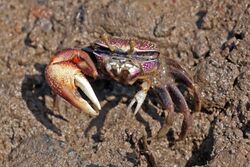Biology:Uca tangeri
| Uca tangeri | |
|---|---|

| |
| male, Gambia | |
| Scientific classification | |
| Kingdom: | |
| Phylum: | |
| Subphylum: | |
| Class: | |
| Order: | |
| Infraorder: | |
| Family: | |
| Genus: | |
| Species: | U. tangeri
|
| Binomial name | |
| Uca tangeri (Eydoux, 1835)
| |
| Synonyms [1] | |
| |
Uca tangeri is a species of fiddler crab that lives along the Atlantic coasts of southwestern Europe and western Africa.
Description
Uca tangeri is the largest species of fiddler crab, with a carapace up to 50 millimetres (2.0 in) wide,[2] and up to 25 mm (1.0 in) long.[3] The males have one claw much larger than the other, which they use for communication.[4] The carapace is violet to black, or sometimes yellowish in females, while the appendages are yellowish brown.[3]
Distribution
The range of Uca tangeri extends from southern Portugal southwards to Angola;[3] it is the most abundant crab in The Gambia.[4]
Taxonomy
Uca tangeri was first described by Joseph Fortuné Théodore Eydoux in 1835 as Gelasimus tangeri. The specific epithet tangeri refers to the Gulf of Tangier, Morocco, the species' type locality.[3] The common name preferred by the Food and Agriculture Organization is West African fiddler crab (French: gélasime africain; Spanish: violinista africano).[5]
See also
References
- ↑ Shih, Hsi Te; Ng, Peter K.L.; Davie, Peter J.F.; Schubart, Christoph D.; Türkay, Michael; Naderloo, Reza; Jones, Diana (2016). "Systematics of the family Ocypodidae Rafinesque, 1815 (Crustacea: Brachyura), Based on phylogenetic relationships, With a reorganization of subfamily rankings and a review of the taxonomic status of Uca Leach, 1814, Sensu lato and its subgenera". Raffles Bulletin of Zoology 64: 139–175. http://ir.lib.nchu.edu.tw/bitstream/11455/94724/1/Shih%262016_Ocypodidae_revision_s.pdf.
- ↑ Richard G. Hartnoll (1988). "Evolution, systematics, and geographical distribution". Biology of the Land Crabs. Cambridge University Press. pp. 6–54. ISBN 978-0-521-30690-4. https://books.google.com/books?id=RR09AAAAIAAJ&pg=PA42.
- ↑ 3.0 3.1 3.2 3.3 R. W. Ingle (1997). "True crabs (Brachyura)". Crayfishes, Lobsters, and Crabs of Europe: an Illustrated Guide to Common and Traded Species. Springer. pp. 115–176. ISBN 978-0-412-71060-5. https://books.google.com/books?id=x-qVGbTAOiEC&pg=PA164.
- ↑ 4.0 4.1 Craig Emms; Linda Barnett; Richard Human (2006). "Natural history". The Gambia (2nd ed.). Bradt Travel Guides. pp. 25–46. ISBN 978-1-84162-137-1. https://books.google.com/books?id=V6-H1OysekcC&pg=PA41.
- ↑ Domingo Lloris; Jaime Rucabado (1998). "Crustacés" (in French). Guide d'Identification des Ressources Marines Vivantes du Maroc. Guide FAO d'identification des espèces pour les besoins de la pêche. Food and Agriculture Organization. pp. 165–192. ISBN 978-92-5-204162-7. https://books.google.com/books?id=wdPpKMZiZGYC&pg=PA190.
Wikidata ☰ Q3819528 entry
